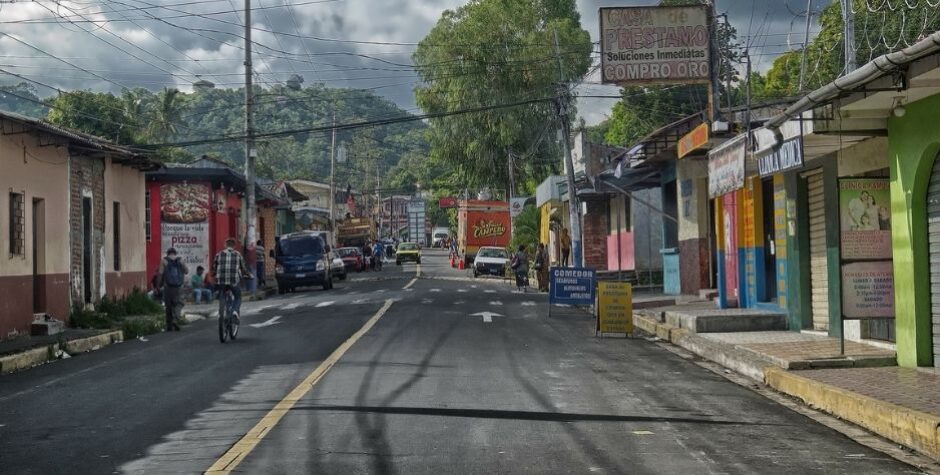

Abortion and Infanticide: The ECLJ Before the Inter-American Court
The IACHR to Rule on Infanticide
The ECLJ usually intervenes in cases before the European Court of Human Rights (ECHR) as amicus curiae, i.e. a third party providing the Court with an expertise or opinion. For the first time, the ECLJ intervenes as amicus curiae in a case on the other side of the Atlantic, at the Inter-American Court of Human Rights. Our amicus brief is available here.
The Inter-American Court is the judicial institution of the Organization of American States (OAS). This Court, based in San José, Costa Rica, is the equivalent of the Strasbourg Court for the states of the American continent. It interprets and enforces the American Convention on Human Rights in states party to that Convention, such as El Salvador.
The case of Manuela y otros Vs. El Salvador (No. 13.069) caught our attention for two major reasons. On the one hand, it is a concrete example of the justification of neonatal infanticide, i.e., the killing of a newborn child. The ECLJ had denounced this practice, on the basis of testimonies, in European institutions and at the UN (see a video here). On the other hand, the promoters of abortion, who are campaigning in this case for the decriminalization of infanticide, claim to rely on European human rights law. The ECLJ wished to expose this fraud.
Infanticide presented as the only solution for a mother in distress
According to the American Convention, the right to life “shall be protected by law and, in general, from the moment of conception” (Article 4 § 1). However, as at the ECHR, NGOs are multiplying strategic litigation aimed at developing new norms of international law that would be compatible with an ever-increasing liberalization of abortion. The applicant NGOs in the Manuela y otros Vs. El Salvador case aim at this objective and even go beyond it, seeking to decriminalize infanticide. Even several weeks after birth, a baby would not be protected by the right to life.
The case began in February 2008. A woman, Manuela, went to a hospital in El Salvador, claiming to have had a miscarriage. After a medical examination, the hospital submitted a report to the public prosecutor's office stating that Manuela probably had an intentional abortion, which is a crime prohibited by law. Based on this report, a search was conducted in Manuela's home and the corpse of a newborn baby was found. The autopsy revealed that the child had been murdered after birth. Manuela was sentenced in August 2008 to thirty years in prison, not for abortion but for the murder of her son. In April 2010, Manuela died in prison, following a heart attack; she was suffering from cancer, diagnosed a year earlier.
Manuela is part of a group known as “las 17 +”, more than seventeen women convicted of infanticide in El Salvador. NGOs conducted a political and media campaign based on these women's stories, claiming that infanticide of their children was their only solution, due to the abortion ban and their economic and social conditions. In 2012, the Center for Reproductive Rights brought Manuela's case to the Inter-American Commission on Human Rights. This Commission decided to refer the case to the Inter-American Court, which communicated the application Manuela y otros Vs. El Salvador on September 2, 2019. A public hearing is expected to take place in early 2021, before a judgment in the coming months.
ECHR case law abusively instrumentalized
The Inter-American Commission, in its report on the merits of the case for the Inter-American Court, concluded that Manuela was the object of arbitrary and abusive interference with her privacy (Article 11 § 2 of the American Convention). In support of this position, the Inter-American Commission refers to the jurisprudence of the ECHR. Its objective was to show that if the European Court had had to decide on such a case, it would have condemned the state concerned for violating Manuela's right to privacy (Article 8), due to the lifting by the hospital of the medical confidentiality.
The ECLJ's amicus brief demonstrated, on the basis of the case law of the ECHR, that Manuela's right to confidentiality of her health data was not violated. To understand why, let's review the steps that the Court would have taken to decide on such a case, with particular emphasis on the jurisprudence voluntarily set aside by the opposing party.
- Article 8 is applicable, but the unborn child also has rights
The right to confidentiality of personal health data is indeed a part of the right to respect for one's private life, protected by Article 8 of the European Convention on Human Rights. The ECLJ agrees with the Inter-American Commission on this issue.
On the other hand, since Manuela had been pregnant, the medical data related to her pregnancy did not only affect her privacy. Indeed, according to the judgment in Grand Chamber A, B and C v. Ireland, “Article 8 cannot be interpreted as meaning that pregnancy and its termination pertain uniquely to the woman’s private life as, whenever a woman is pregnant, her private life becomes closely connected with the developing foetus. The woman’s right to respect for her private life must be weighed against other competing rights and freedoms invoked including those of the unborn child.”[1] The child's body is not absorbed by the mother's body; they are medically and legally distinct. In El Salvador, the Constitution further recognizes that “every human being is a human person from the moment of conception.”[2] Therefore, medical data on a pregnancy concerns both mother and child.
- There was an interference with Manuela's right to privacy.
By informing the Public Prosecutor’s Office of the findings of a medical examination, the hospital restricted the confidentiality of Manuela's pregnancy-related medical data.
- The interference in lifting medical confidentiality was provided for by law.
Pablo Nuevo López, professor at the Abat Oliba CEU (Barcelona, Spain) and co-signatory of the ECLJ amicus brief, confirmed that El Salvador meets the conditions required by the ECHR for the lifting of medical secrecy to be considered legal. Since abortion is recognized in El Salvador as a crime, punishable of two to eight years in prison,[3] medical personnel are obliged to lift medical confidentiality in the event of an allegation of such a crime. This legal obligation complies with the formal and qualitative requirements of the ECHR.
- The interference had three legitimate objectives recognized by the European Convention
- Prevention of the crimes of abortion and infanticide
The ECHR recognizes that criminal investigations and prosecutions are a legitimate purpose for limiting the confidentiality of medical information.[4] In order to ensure that such an objective is pursued, the Court has already been able to require medical facilities to report “any instances of alleged criminal behaviour to the prosecutor’s office.”[5] The Court has even accepted that the conduct of a civil divorce proceeding may be a legitimate purpose for limiting medical confidentiality.[6]
In the Manuela case, the alleged crime that justified the lifting of medical confidentiality was abortion, and the crime actually committed was aggravated homicide. These acts are of the same nature, since they consist of the wilful killing of a child, either before or after birth. The hospital limited the confidentiality of Manuela's medical data because of her alleged criminal behaviour. The subsequent investigation and proceedings, initiated by the prosecutor, revealed that she had indeed murdered her newborn child.
- The protection of morals based on respect for human life
In A, B and C v. Ireland, the Grand Chamber of the ECHR held that the restriction of the applicants' rights "pursued the legitimate aim of the protection of morals of which the protection in Ireland of the right to life of the unborn was one aspect".[7]
In El Salvador, the right to life of unborn and born children is an aspect of morality, the protection of which legitimizes a limitation on the confidentiality of health data.
- The protection of the right to life of children, unborn and newborn
The ECHR affirms that the protection of the rights and freedoms of others is a legitimate objective for which a limitation on the confidentiality of health data may be necessary.[8] The European Court has never excluded prenatal life as a matter of principle from the scope of Article 2 of the Convention (right to life).[9] The Court even recognizes that the embryo and the unborn child belong to the "human race".[10] Moreover, it clearly states that "Article 8 cannot… be interpreted as conferring a right to abortion".[11]
In this case, El Salvador pursued the legitimate objective of protecting the right to life of children, both unborn and newborn.
- Limiting medical confidentiality was necessary to achieve these objectives.
After demonstrating that the State is pursuing legitimate objectives, the ECHR would review in Manuela that there is a fair balance between those objectives and Manuela's right to privacy. In its amicus brief, the ECLJ identified the elements that would be taken into account by the ECHR in such a case to meet this balance.
- The seriousness of the crimes of abortion and infanticide
According to the ECHR, the interest in conducting a criminal investigation may outweigh a patient's interest in the confidentiality of his or her medical data, particularly in the case of an allegation of crime.[12]
- The direct link between the medical data collected and the alleged crimes
The ECHR requires that the collected medical data must be assessed as "potentially decisive", "relevant" or "of importance" to achieve the objective pursued.[13] In civil proceedings concerning a divorce, the Court considered that "any unavoidable interference in this connection should be limited as far as possible to that which is rendered strictly necessary by the specific features of the proceedings and by the facts of the case".[14] In another case, the Court noted that the health details revealed must be likely to affect the outcome of the litigation.[15]
In this case, there is a clear connection between the content of the medical data revealed on Manuela and the proceedings against her. Indeed, the hospital revealed to the public prosecutor that a medical examination had shown that "an umbilical cord approximately 40 cm long had emerged, cleanly cut and with a perianal tear (...) the patient's placenta was calcified".[16] This meant that Manuela's pregnancy had been terminated by a voluntary act and that she had lied when pretending to have had a miscarriage.
- A very limited disclosure of the collected health data
In the case of limitations on the confidentiality of health data, the ECHR is attentive to the extent of the disclosure. The Court considers whether the data have been "disclosed and made public",[17] whether they have been communicated to a large number of persons, whether they have been the object of "systematic storage"[18] and whether the data subject is "identifiable".[19] The Court also considered whether the consequences of such disclosure of health data "exceed the normal and unavoidable consequences of such a situation".[20]
In this case, "Manuela" is not a real name but a nickname. Moreover, the disclosure of the medical data is directly related to her crimes, does not involve any storage and did not have any consequences in itself.
For all these reasons, the interference with Manuela's right to privacy was necessary to achieve the legitimate objectives of Article 8 § 2.
A progressive coalition, mainly American, against El Salvador
The argument of the applicant NGO, the Center for Reproductive Rights, was supported by: American university legal clinics such as Yale University, New York University, City University of New York, Loyola Marymount University, Georgetown University, University of British Colombia (Canada); many so-called "pro-choice" NGOs; academics and intellectuals; and Philip G. Alston, United Nations Special Rapporteur on Extreme Poverty and Human Rights. All of these structures and individuals not only politically supported the requesting NGO, but intervened in the proceedings as amici curiae, that is, with the same role as the ECLJ.
The most shocking thing about the argument of the Center for Reproductive Rights and its allies is that it makes no difference between abortion and infanticide. It justifies the decriminalization of both in the name of the same "feminist" pretexts. Children, even once born, would not be protected by the law.
______
[1] A, B and C v. Ireland [GC], no. 25579/05, 16 December 2010, § 213.
[2] Constitution of El Salvador, 1983, Article 1 § 2. (free translation).
[3] Criminal Code of El Salvador, Legislative Decree 1030 of 10 June 1997, Title I, Chapter II, Article 133.
[4] Avilkina and Others v. Russia, no. 1585/09, 6 June 2013, § 45.
[5] Ibid, § 47.
[6] L.L. v. France, no. 7508/02, 10 October 2006, § 45.
[7] A, B and C [GC], op. cit, §§ 227 and 222. See also: Open Door and Dublin Well Woman v. Ireland, nos. 14234/88, 14235/88, 29 October 1992, § 63.
[8] L.L., op. cit. § 40.
[9] Boso v. Italy, no. 50490/99, decision of 5 September 2002: "In the Court’s opinion, such provisions strike a fair balance between, on the one hand, the need to ensure protection of the foetus and, on the other, the woman’s interests"; Vo v. France [GC], no. 53924/00, 8 July 2004, §§ 86 and 95: "the unborn child’s lack of a clear legal status does not necessarily deprive it of all protection under French law. However, in the circumstances of the present case, the life of the foetus was intimately connected with that of the mother and could be protected through her" and "even assuming that Article 2 was applicable in the instant case (see paragraph 85 above), there has been no violation of Article 2 of the Convention".
[10] Vo [GC], op. cit. § 84
[11] A, B and C [GC], op. cit., § 214
[12] Avilkina, op. cit., § 45.
[13] L.H. v. Latvia, no. 52019/07, 29 April 2014, §§ 57 and 58.
[14] L.L., op. cit., § 45.
[15] Panteleyenko v. Ukraine, no. 11901/02, 29 June 2006, § 61.
[16] Criminal case TS066/2008. Police interrogation of Dr. Johana Vanessa Mata Herrera, February 28, 2008.
[17] L.L., op. cit., § 33.
[18] P.T. v. Republic of Moldova, no. 1122/12, May 26, 2020, § 26
[19] Ibid
[20] Jankauskas v. Lithuania (no. 2), no. 50446/09, 27 June 2017, § 76.













